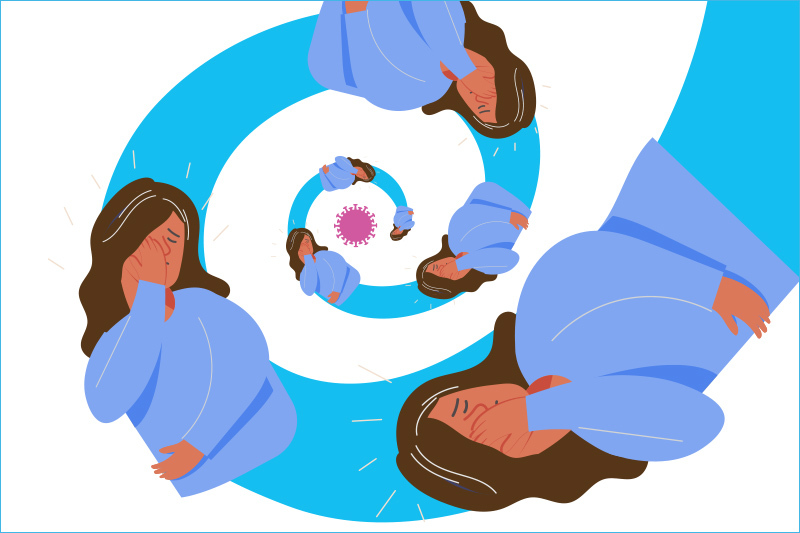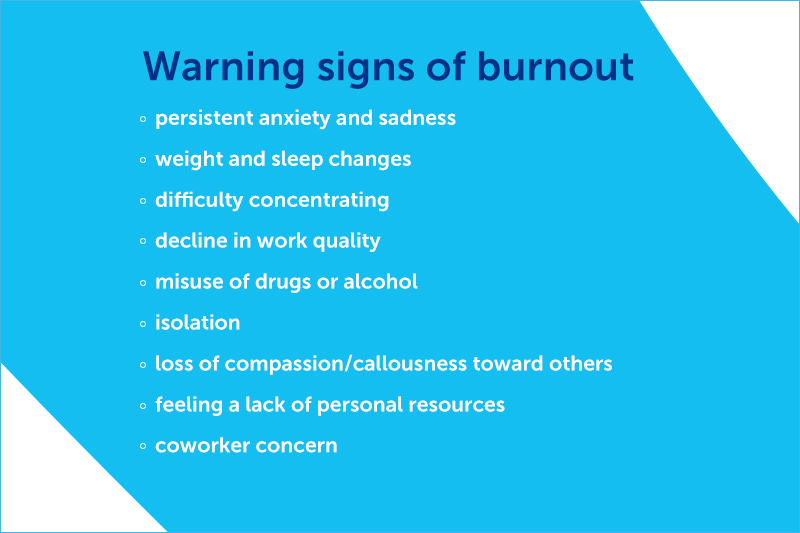Burnout from COVID-19: What clinicians should know

Many clinicians are already all too familiar with the extreme exhaustion and stress associated with burnout. According to one recent report, overall rates of physician burnout for 2019 were at 42 percent. While that’s a slight drop from five years ago, these statistics don’t take the current COVID-19 pandemic into account.
Although we don’t yet have data for U.S. clinicians, early statistics from China are troubling. One study of 1,257 health care workers who treated patients exposed to COVID-19 in China found that 71.5 percent reported distress, 50.4 percent reported symptoms of depression, 44.6 percent reported anxiety, and 34 percent reported insomnia. According to the study’s authors, “Working on the frontline was an independent risk factor for worse mental health outcomes in all dimensions of interest.” (JAMA Network Open, March 2020)
COVID-related stress: Pediatric providers aren’t immune
Because the virus has so far had milder effects in most children, pediatric clinicians might feel less of an impact than their frontline colleagues who treat adults. Yet, like their adult colleagues, they may share anxieties regarding access to appropriate personal protective equipment, exposure to COVID-9 at work, taking the infection home to their families, and suboptimal access to testing if they develop symptoms.
The pandemic combined with the evolving public health response has emerged as a significant stressor for all pediatric providers, but particularly those who are the most vulnerable to developing troubling burnout, says David DeMaso, MD, Psychiatrist-in-Chief and director of the Office of Clinician Support at Boston Children’s Hospital. “The uncertainties around COVID-19, grief from the loss of ‘normalcy,’ and concerns about changed workloads can all contribute to heightened stress and the precipitation of burnout,” he explains.
To self-screen for burnout, DeMaso says physicians should ask themselves two questions: Do I feel burned out by my work? and Have I become more callous toward people? If the answer to either question is “a few times a week” or “daily,” this is a positive screen for burnout. See below for other signs of burnout.

Coping with burnout in uncertain times
DeMaso says that he and his colleagues in the Office of Clinician Support have noticed an uptick in the number of clinicians reaching out to talk since the COVID-19 pandemic took hold. “We offer virtual session for both individuals and groups,” he says. “We’re actually holding more group sessions virtually now than we previously did in person. Lots of people want to connect.”
The office is also creating a service called Doctors Offering Coping Support, which will train physicians to offer peer support and will be launched in May. In addition to seeking support, DeMaso recommends that stressed clinicians perform good self-care, such as getting regular exercise, practicing relaxation techniques, and taking time to connect with family, friends, or colleagues virtually to keep isolation at bay.
One thing you shouldn’t do: Keep your feelings to yourself. “Don’t ignore your distress, because taking care of yourself is directly connected to taking care of others,” says DeMaso. “It’s important to understand that burnout is an occupational hazard and self-monitoring is key.”
Get more answers about Boston Children’s response to COVID-19 and learn about the Office of Clinician Support.
Related Posts :
-

Model enables study of age-specific responses to COVID mRNA vaccines in a dish
mRNA vaccines clearly saved lives during the COVID-19 pandemic, but several studies suggest that older people had a somewhat reduced ...
-

New insight into the effects of PPIs in children
Proton-pump inhibitors (PPIs) are frequently prescribed to suppress stomach acid in patients with gastroesophageal reflux disease (GERD). Prescribing rates of ...
-

Creating the next generation of mRNA vaccines
During the COVID-19 pandemic, mRNA vaccines came to the rescue, developed in record time and saving lives worldwide. Researchers in ...
-

Firearm suicides in children and youth: A state-by-state look
At a time when mental health problems are skyrocketing, a new study provides one of the most comprehensive state-by-state accountings ...





